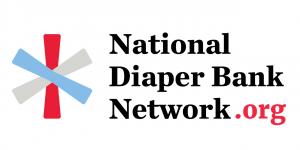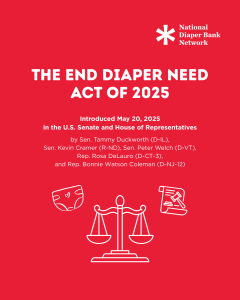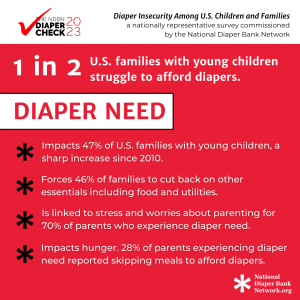With End Diaper Need Act, Congress Could Improve Child Health, Help Working Families
Proposed legislation would providing funding to states and other eligible organizations, such as nonprofit diaper banks, to get diapers to families in need.
“Our more than 240 member diaper banks are keeping babies healthier and helping parents access child care,” said National Diaper Bank Network CEO Joanne Samuel Goldblum. “But our research shows that diaper need has become much more widespread in the years that we have been tracking it. Unmet diaper need is pervasive in all of our communities throughout the country. A public health issue of this scale cannot be solved without our government investing in the proven solution to end diaper need.”
Introduced in both the Senate (S. 1815) and the House (H.R. 3508), the bipartisan legislation would make federal funding available to states and other eligible organizations, such as nonprofit diaper banks, to get diapers to families in need. It also provides support for adult incontinence products for people who have a low income or disability. The funding, which would come through the Social Services Block Grant Program, would total $200 million for each fiscal year through 2029.
Previous versions of the bill have not advanced in either the Senate or the House. But advocates believe that new research showing the health and economic gains arising from providing diapers to families will persuade members of Congress to invest in the well-being of vulnerable children.
“Diaper banks achieve amazing outcomes for the families they serve,” said Goldblum. “When soiled diapers are not changed as needed, babies develop painful rashes, infections, and other illnesses that require preventable and costly medical care. One in four parents miss work or school because they cannot afford the diapers that child care providers require them to supply. Giving babies diapers keeps children healthier and helps families prosper.”
Organizations endorsing the legislation include: Aeroflow, Center for Baby and Adult Hygiene Products, Center for Law and Social Policy, Child Welfare League of America, Coalition on Human Needs, First Focus for Children, HDI Wholesale, HIPPY US, JSL, Kimberly-Clark Corp., MomsRising, National Diaper Bank Network, National Women's Law Center Action Fund, Parents as Teachers, and ZERO TO THREE. Additional nonprofits and businesses are expected to join the list of supporters in the coming weeks.
About National Diaper Bank Network:
The National Diaper Bank Network (NDBN) leads a nationwide movement dedicated to helping individuals, children and families access the basic necessities they require to thrive and reach their full potential, including clean, dry diapers, period supplies, and other basic needs. Launched in 2011 with the support of founding sponsor Huggies®, NDBN is dedicated to creating awareness, providing assistance, and building community to #EndDiaperNeed in the U.S. Its active membership includes more than 320 basic needs banks serving local communities in all 50 U.S. states, the District of Columbia, and Puerto Rico. More information on NDBN and diaper need is available at nationaldiaperbanknetwork.org, and on Instagram (@DiaperNetwork), X, formerly Twitter (@DiaperNetwork), Facebook (facebook.com/NationalDiaperBankNetwork), and Bluesky (@diapernetwork.bsky.social).
Troy Moore
National Diaper Bank Network
email us here
Visit us on social media:
Bluesky
Instagram
Facebook
X
Legal Disclaimer:
EIN Presswire provides this news content "as is" without warranty of any kind. We do not accept any responsibility or liability for the accuracy, content, images, videos, licenses, completeness, legality, or reliability of the information contained in this article. If you have any complaints or copyright issues related to this article, kindly contact the author above.
Richie Mike Drops His Sizzling Summer Single, 'Stackin Dem Racks'
Rakiie Introduces Preventive Joint Support Solutions for Everyday Use
787 Coffee Joins World of Coffee Geneva 2025 - Bringing Innovation to Continue Leading NYC Specialty Coffee
Więcej ważnych informacji
 Jedynka Newserii
Jedynka Newserii

 Jedynka Newserii
Jedynka Newserii

Handel

Komisja Europejska chce wprowadzić ujednolicone przepisy dotyczące wyrobów tytoniowych. Europosłowie mówią o kolejnej nadregulacji
Ministerstwo Zdrowia opracowało nowy projekt przepisów wprowadzających kolejne zakazy dotyczące wyrobów tytoniowych – całkowitą eliminację e-papierosów oraz zakaz aromatów w woreczkach nikotynowych. Najprawdopodobniej w ciągu kolejnych dwóch–trzech lat Polska będzie musiała implementować nową dyrektywę dotyczącą wszystkich produktów tytoniowych, nad którym niebawem ma rozpocząć prace Komisja Europejska. Europosłowie mówią o ryzyku chaosu legislacyjnego, nadregulacji i wskazują na zagrożenia związane z proponowaną podwyżką akcyzy.
Konsument
Za trzy miesiące ruszy w Polsce system kaucyjny. Wątpliwości budzą kwestie rozliczeń i podatków

Zaledwie trzy miesiące zostały do startu systemu kaucyjnego w Polsce. Kaucje obejmą szklane i plastikowe butelki oraz puszki z napojami. To duża zmiana dla producentów napojów, sklepów i konsumentów oraz pośredniczących w zbiórce operatorów systemów kaucyjnego. Na razie przepisy są na tyle niedoprecyzowane, że budzą wiele wątpliwości w kwestii rozliczania podatków czy rozliczeń z operatorami. Producenci będą musieli płacić podatek od niezwróconych butelek, co zwiększy ich koszty.
Transport
Rośnie skala agresji na polskich drogach. Problemem jest nie tylko nadmierna prędkość, ale też jazda na zderzaku

Za kilka dni zaczynają się wakacje, czyli statystycznie najniebezpieczniejszy czas na drogach. Wśród głównych przyczyn takich zdarzeń na prostych odcinkach drogi są nadmierna prędkość i jazda na zderzaku. Zarządca autostrady A4 Katowice–Kraków w ramach kampanii „Nie zderzakuj. Posłuchaj. Jedź bezpiecznie” zwraca uwagę na zjawisko agresji na polskich drogach i przypomina, że bezpieczeństwo zaczyna się od osobistych decyzji kierowcy.
Partner serwisu
Szkolenia

Akademia Newserii
Akademia Newserii to projekt, w ramach którego najlepsi polscy dziennikarze biznesowi, giełdowi oraz lifestylowi, a także szkoleniowcy z wieloletnim doświadczeniem dzielą się swoją wiedzą nt. pracy z mediami.












.gif)

 |
| |
| |
|